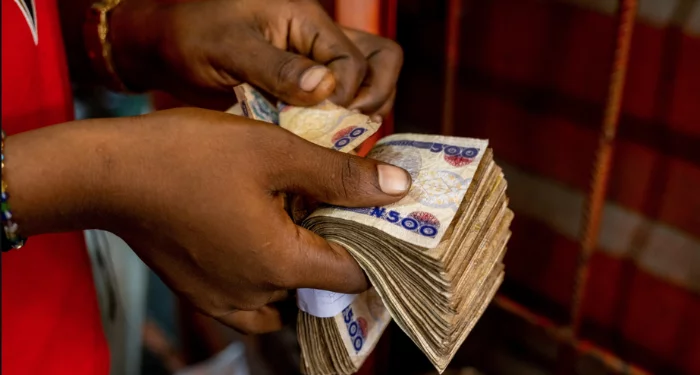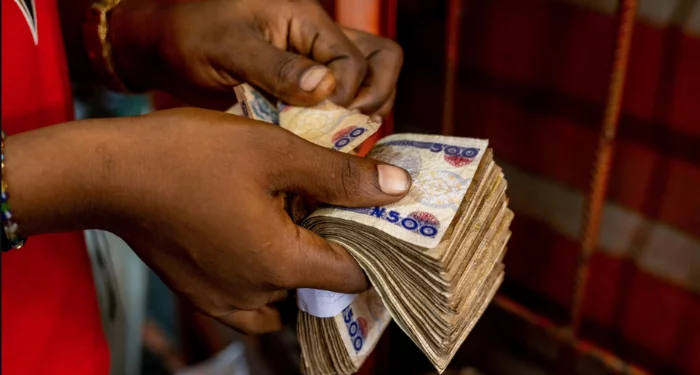[ad_1]

Nigerians have increased their hoarding of cash, with as much as 94% of the currency in circulation held outside banks by March 2024.
An analysis of the latest money and credit statistics data from the Central Bank of Nigeria (CBN) shows that while currency in circulation was N3.87 trillion, currency outside banks was N3.63 trillion.
Also, the percentage of cash hoarding has been on the rise. January 2024 saw 90% of the currency in circulation being held outside the banking system, climbing to 92% in February, and reaching 94% by March.
This pattern reflects a growing lack of confidence in the banking system or an increased preference for cash transactions, possibly driven by economic uncertainty or other socio-economic factors.
This alarming trend signals a severe liquidity crunch, posing significant risks to the nation’s financial stability and economic growth.
Rise in currency circulation
Data from the first quarter of 2024 shows an alarming rise in the amount of currency in circulation.
In January 2023, the currency in circulation stood at N1.39 trillion, which more than doubled by January 2024 to reach ₦3.65 trillion.
This trend continued with February recording a cash circulation of N982.1 billion in 2023 and a significant jump to N3.69 trillion in 2024.
By March, the figures had escalated further from N1.68 trillion in 2023 to N3.87 trillion in 2024. This March figures show an increase of 130%, suggesting that the CBN has released a substantial amount of cash to address the scarcity created by its earlier currency redesign policy.
Currency outside banks
The currency held outside banks has similarly surged. In January 2023, N792.18 billion was reported outside the banking system, which increased to N3.28 trillion by January 2024. February saw an increase from N843.31 billion in 2023 to N3.41 trillion in 2024.
By March, the amount had grown from N1.45 trillion in 2023 to a staggering N3.63 trillion in 2024, showing an increase of 150%. This increase further means that Nigerians are hoarding cash faster than the CBN has released enough to circulate.
Reason and economic implications
The cash hoarding behavior observed in 2024 can be linked to the extensive cash scarcity experienced by Nigerians in 2023. This scarcity was largely a result of the CBN’s flawed implementation of a naira redesign policy, which was part of a broader initiative to transition towards a cashless economy and combat issues like vote-buying and financial crimes.
In 2023, many Nigerians experienced difficulties accessing cash, leading to widespread economic disruption and a loss of trust in the banking system. This loss of trust, combined with the fear that old naira notes would lose their legal tender status, led people to start hoarding cash.
As a response to the acute cash shortages, people’s reluctance to deposit their money in banks grew, fostering a habit of cash hoarding.
This trend continued into 2024, evidenced by the staggering 94% of currency in circulation being kept outside of banks by March. This behavior reflects an enduring skepticism towards the banking system and the economic policies of the government.
The hoarding of such large amounts of cash outside the formal banking sector poses significant challenges.
It restricts the effective circulation of money, impacting liquidity and reducing the efficacy of monetary policy in regulating the economy.
This situation could lead to higher transaction costs and reduced availability of credit, further slowing economic activity.
Last year, the CBN stated that there was “high volume withdrawals from the CBN branches by Deposit Money Banks (DMBs) and panic withdrawals by customers from the ATMs.”
The CBN also warned banks and Point of Sales (POS) merchants over the hoarding of cash in the country, noting that an alleged collusion between the banks and PoS merchants disrupted the seamless circulation of the naira notes.
Despite the earlier suspension of the processing charges previously imposed on large cash deposits, Nigerians seem to hoard more cash at home rather than deposit in banks.
[ad_2]
Source link







